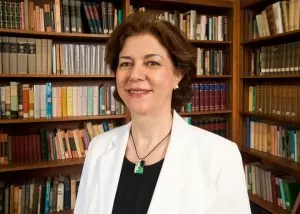State, Elites and Sovereignty in Modern Iran
Free Conference
Saturday, July 22, 2023 – 8:30 am
Innis Town Hall Theatre

Nayereh Tohidi is a Professor Emerita and former Chair of Gender & Women’s Studies and the Founding Director of the Middle Eastern and Islamic Studies (2011-2021) at California State University, Northridge. She is also a Research Associate in the Program of Iranian Studies at UCLA coordinating its “Bilingual Lecture Series on Iran” since 2003. She received her MA and Ph.D. from the Universities of Tehran and Illinois in Champaign-Urbana in Ed Psych and Sociology. She is a recipient of several post-doctoral fellowships and research awards, including an NEH grant, a year of Fulbright lectureship and research at the Academy of Sciences of the Soviet Republic of Azerbaijan; universities of Harvard and Stanford, the Kennan Institute of the Woodrow Wilson Center, and Keddie-Balzan Fellowship at UCLA. Her teaching and research expertise include gender and sustainable development; women’s movements and feminisms; women and Islam; globalization, ethnicity, and democracy in Iran and the post-Soviet Caucasus. Her extensive publications include editorship or authorship of three books and numerous articles and interviews in peer-reviewed academic and policy-oriented journals. Tohidi has integrated academic excellence with transnational human/women’s rights activism. She represented women NGOs at the UN-sponsored third and fourth World Conferences on Women in Nairobi and Beijing. She has also served as a consultant for the UN agencies (UNICEF and UNDP) on issues concerning children and women’s rights and status in the Caucasus and the Middle East. Since 2015, she has also joined the faculty board of the online Iran Academia of the Institute for Social Sciences in the Hague.
Abstract
As a pioneering member of the first generation of Iranian feminists, Sedigheh Dowlatabadi (1882-1961), has been celebrated for her significant contributions to Iran’s women’s rights movement through 1906-1960. Her views, activism, and challenges were influenced by the context of the Qajar era and the Constitutional Revolution and later also by the modernization era under the Pahlavi dynasty. In her various activities in different organizations, she navigated between liberalism, socialism, feminism, nationalism, and Islam in her evolving ideological tendencies or because of her pragmatic approach. She was a journalist, educator, and founder of schools for girls; one of the first representatives of Iranian women in international conferences on women in Europe; and one of the first women to stop wearing the veil and adopt modern (“Western”) style of dress. Her prolific and rather paradoxical personal and social life represents not only the construction of the “modern womanhood” in Iran but also how she herself contributed to this construction. Like most other influential Iranian feminists, she had to navigate between the state-provided opportunities and obstacles, including the daily prejudices of ordinary people, the attacks instigated by the patriarchal and conservative clergy against nontraditional or non-conformist women. This lecture will end by pointing out her legacy for the present Iran, especially the new social movement of Jina or the Woman-Life-Freedom.